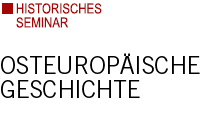Dr. Wolfgang Schneider
ehem. akademischer Mitarbeiter Koordinator des Forschungsprojekts "Violence Against Civilian Victims on the Eastern Front of World War II"
Dissertationsprojekt (abgeschlossen Oktober 2022): From Gray Zones to Red Courts – Soviet Collaboration Trials of Jewish Council Members and Ghetto Policemen from Transnistria The research project “From Gray Zones to Red Courts” examines Soviet trials of Jewish Council members of Transnistrian ghettos charged with collaboration. Analyzing sociopolitical implications of these trials, the project primarily draws on recently declassified Soviet secret services’ investigation and trial documents as well as memoirs and oral history interviews. Taking on a perspective “from above” as well as one “from below”, the judicial proceedings are conceptualized as a “locus for interaction” between Soviet state and Holocaust survivors, who constituted the majority of witnesses. For survivors, the trials offered an opportunity to voice demands for justice and retribution and to try to come to terms with the recent past. Here, the project also asks about the influence of social conflicts in the ghetto upon witnesses’ perceptions of defendants. The Jewish Councils in Transnistria were mainly recruited from among the deportees from Romania, while the local Ukrainian Jews were excluded from such positions. This lead to a partial “nationalization” of the structural opposition between Jewish Councils and ghetto inhabitants, which is echoed in witness’ testimonies. The investigation and trial records thus offer unique insights into survivors’ perceptions of the role of Jewish Councils and their experiences during the Holocaust from the immediate post-liberation period.
Zur Person: 04/2023-03/2024 Akademischer Mitarbeiter am Lehrstuhl 10/2022 Abschluss der Promotion 12/2017-07/2018 Edith Milman Fellow am United States Holocaust Memorial Museum 06/2016 - 01/2023 wissenschaftlicher Mitarbeiter im Drittmittelprojekt „Violence Against Civilian Victims on the Eastern Front of World War II“, Doktorand bei Prof. Dr. Tanja Penter 2016 Abschluss 1. Staatsexamen für das gymnasiale Lehramt Studium der Geschichte und der Slavistik in Heidelberg und Sankt Petersburg 2007 Abitur am Eleonoren-Gymnasium Worms Geboren 1987 in Worms |


